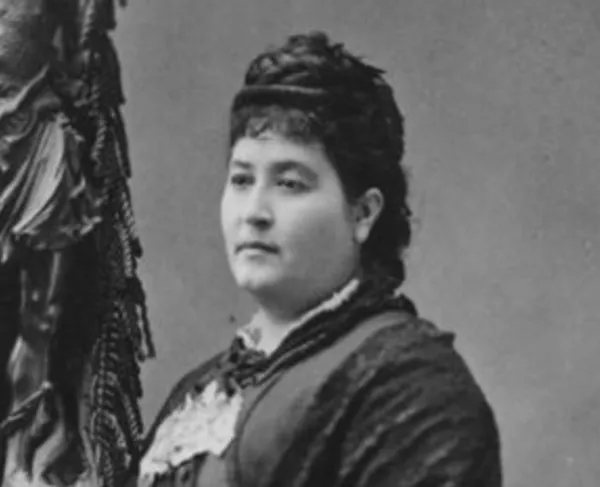Maria Ruíz de Burton

Maria Ruíz de Burton was a ‘Renaissance Woman’ of her time, excelling in politics, writing, and activism throughout the 19th century.
Born on July 3, 1832, in Loreto, Baja California, Maria Ruíz de Burton developed her political conscience from a young age. As a teenager, Maria had a first -hand experience with the violence of war, as the U.S. Army invaded and occupied her hometown of Loreto during the Mexican-American War. Additionally, Maria developed a keen interest in politics, as her grandfather, José Manuel Ruíz, served as the military commander and governor of Baja California.
Following the conclusion of the Mexican-American War in 1848, Maria met the man she would later marry, West Point Graduate and Army Captain Henry S. Burton. Henry was an unusual candidate for Maria’s romantic interest, as he commanded the Army that occupied Maria’s hometown. To top things off, Henry was a devout Protestant— a stark contrast in values compared to Maria’s Catholic faith. Likewise, Maria denounced the U.S. Army that occupied her hometown and advocated for the Mexican population during the Mexican-American War. Aside from their shared love and companionship, Henry and Maria had little in common. Nonetheless, the two worked out a complex set of negotiations, effectively creating and maintaining a marital bond throughout their lives.
In addition to her social ties, Maria Ruíz de Burton’s education prepared her for involvement in writing and activism. Maria’s curriculum entailed studies of the Spanish, French, and English languages, the classics, literature, U.S. and European history, and other subjects. In 1852, Henry and Maria began a period of relocations after Henry accepted an assignment as commander of the San Diego Army Post. The couple initially moved to San Diego, but they relocated to Ft. Monroe, VA prior to the Civil War in hopes of promoting the Union cause.
During this relocation period, Maria utilized the inconvenience of moving as an opportunity to broaden her worldview and pinpoint her role within it. For instance, Maria both tended to her husband and children and accompanied her husband to Army-related events. When possible, Maria took advantage of the opportunity to observe Congress from the visitor’s gallery. Consequently, Maria sharpened her political consciousness and became close friends with Mary Todd Lincoln.
Upon the Civil War’s onset, Maria Ruíz de Burton faced a challenging political climate, as injustices directed at the Hispanic population ran rampant throughout the divided American nation. Nonetheless, Maria crafted a platform for her success through her merits and social ties. This foundation allowed her to succeed despite the political tensions of the Civil War and Reconstruction eras.
Maria achieved success as a writer during the Reconstruction era; her works embodied a loyalty to her Mexican roots and an understanding of cultural displacement. In addressing this subject, Maria pioneered Chicano literature, presenting her experiences as a member of the conquered and subordinated Mexican population to the broader American nation. During the 1870s and 1880s, Maria published Who Would Have Thought It? and wrote a play titled Don Quixote de la Mancha: A Comedy in Five Acts. After her works were published, Maria Ruíz de Burton became the first Mexican American writer to publish a book in English. She was the first published Mexican American author after the Mexican-American War.
Maria also experienced great success as a political activist during the Civil War and Reconstruction eras. De Burton set the stage for the Chicano Movement, as she wrote about the injustice inflicted upon people of Spanish and Mexican descent in the United States. Additionally, Maria addressed widespread corruption in American government and society, whether it be in the railroad industry or the hypocrisy of social standards amongst different populations. Maria Ruíz de Burton’s merits in activism resulted in a one-on-one meeting with President Abraham Lincoln at the White House— and an opportunity to present her case to the highest federal authority.
Maria Ruíz de Burton faced a new set of challenges in 1869. After several years of declining health due to the contraction of malaria, Henry Burton passed away in Petersburg, Virginia. Maria was left a widow with a small pension. In order to earn a sustainable living for herself and her family, Maria returned to her ranch in Baja, California. In the few instances when Maria was not tending her family’s needs, Maria filled her spare time with working extra jobs and managing personal goals.
Upon returning to Baja California, Maria learned that parts of her ranch were confiscated, sold, and occupied by squatters. Due to Maria’s drained financial resources, she could not afford legal services to address the squatters living on her property. Instead, Maria wrote her own court briefs in hopes of regaining her property. The outcome of this experience was de Burton’s second book: The Squatter and the Don.
Unfortunately, Maria Ruíz de Burton could not finish her fight to reclaim her land in Baja, California. De Burton passed away from gastric fever on August 12, 1895, in Chicago, where she was attempting to raise the funds needed to reclaim her Baja California land. Maria’s legacy lives on in her authorship and her part in spearheading the movement of Mexican American justice and equality in the United States.





